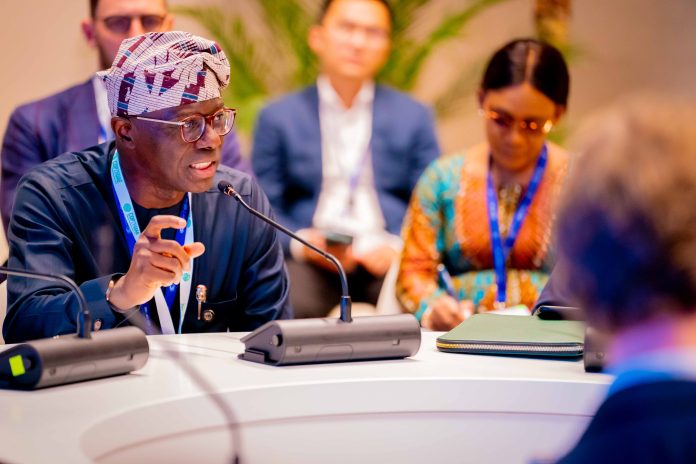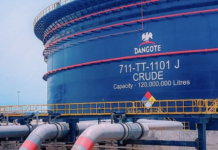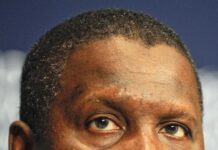
…‘We need long-term financing to address water infrastructure shortage’ – Governor
A long-term financing opportunity that will enable Lagos State Government to adequately meet the demand for safe water by its population was part of the central issues during a conversation at the United Nations (UN) Climate Summit in Dubai, United Arab Emirates.
The discussion was held on Friday at a side meeting with the theme: “Valuing Water: A Lifeline in Climate Transition”, organised by Business and Philanthropy Climate Forum and Sustainable Market Initiative at the ongoing 28th session of Conference of Parties (COP28) at Dubai Exhibition Centre.
At the cross-sectoral roundtable, Governor Babajide Sanwo-Olu pitched a sustainable funding proposal in order to raise private and philanthropic funding in addressing inadequate water infrastructure and supply shortages in Lagos.
Sanwo-Olu disclosed that Lagos, with 22 million population, has a daily demand of 700 million gallons of portable water, but said the State could hardly supply 210 million gallons per day due to shortage of infrastructure.
The Governor said, although provision of clean water had been generally considered a social service, it was an essential element of economic necessity, given its importance to keeping humans healthy.
Lagos, he said, is challenged by increasing demand for clean water. Sanwo-Olu said the inadequacy of supply infrastructure could raise disease vulnerability in underserved communities, pointing out that the State, despite being surrounded by abundant water bodies, could only manage to utilise 40 per cent of its installed water facilities.
He said: “Lagos has an investment of about $2.8 billion in water infrastructure, but there is a burden on the huge population, as we need to create an ecosystem where we can have access to basic needs in the 21st century. Given our meagre resources, it is really a challenge but we certainly cannot continue to give excuses. This gap is being felt by underserved communities and the risk to the public is high.
“We have continued to allocate resources to this sector from our budget, but the intervention is hardly enough to serve the needs of the residents. Four years ago, I gave a commitment of $100 million, but this is like a drop, given the number of investments required to fully explore the potential in the sector. We have huge infrastructure that is not being utilised, making us to operate at less than 40 per cent of the installed capacity.
“Out of the $1.7 trillion needed globally to address the gap in clean water adequacy, Lagos requires less one per cent of the funds to provide safe water. It is my belief that this conversation would lead to sustainable solution that would meet the needs of millions of people that want water adequacy. Our goal is making committed partners believe in economic viability of their investments.”
Sanwo-Olu listed the country’s energy crisis as another factor slowing down the provision of clean water, stressing that irregular power supply rendered resources allocated to the sector inefficient.
The Governor called for equity in global investment towards accelerating water adequacy, noting that humans, regardless of their gender and geographical location, need equal access to clean water.
With 65 per cent of its population made up of young people of under 30, Sanwo-Olu told the funders that Lagos remained an African asset on which viable investments could be made.
He said: “It does not really matter which part of the world we come from, we all need equal access and must be able to hold ourselves accountable on this. In channeling resources, equity has to be a major focus of the global response.
“Lagos has the population. That is why we said a focused investment on water project in the most populated city in West Africa and in a population that is coming to raise global productivity by 2040 is one in the right direction.”
The side meeting, which was moderated by the Secretary General of Insurance Development Forum, Ms. Ekhosuehi Iyahen, had seven other panelists, including Chief Executive Officer (CEO) of WaterAid, Tim Wainright, Chief Sustainability Officer of PepsiCo, and CEO of Dalmia Cement in India, Mahendra Singh.
Others are Chief Operating Officer of Water.org, Vedika Bhandarkar, Managing Partner of AquaForAll, Josien Sluijs, Assistant Director General of Food and Agriculture Organisation at UN, Maximo Torero, and former CEO of Mars, Incorporated, Grant Reid.





